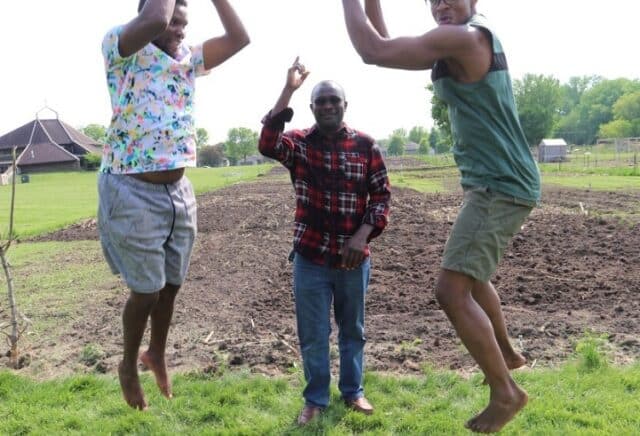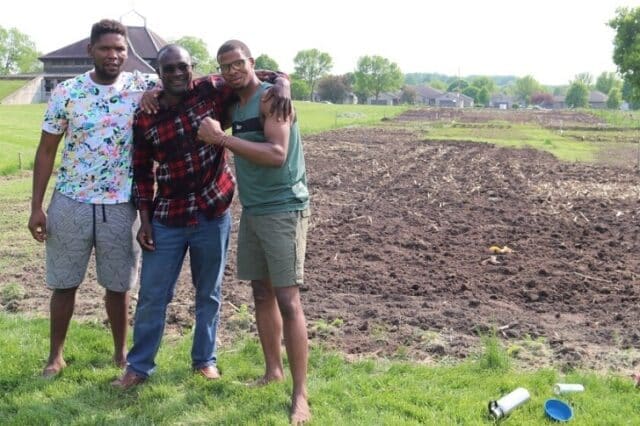
Kenyan Medical professionals Erick Ateka, Moses Moturi and Ben Ongeri all farm their own plots at the Convenant Church Farm ran by the Village Agricultural Cooperative.
Erick
This is the second year that Erick Ateka has farmed a small parcel of land through the Village Agricultural Cooperative. After a good harvest last year, Ateka, who works as a nurse practitioner in Rochester, was excited to plant again this spring.
“I’ve come back, and hopefully I can continue to come back in subsequent years,” Ateka said as he tended to ground he planted in mid-May. “That’s enough time for the kind of produce that I put down, because I usually do the type of crops that take about two to three months to get ready.
Ateka grows collard greens, tomatoes, onions, garlic, cilantro and other produce on his plot. His rotation consists of crops best known to him and for Minnesota’s climate, and produce he enjoys consuming.
“I believe in that organic, healthy eating, so if I can grow some of those crops organically, I find that to be one of the steps towards healthy eating,” he said. “It’s not a way of life, per se, but I do realize to have good food, you have to plant it yourself.”
He grew up in Kisii, which is a densely populated city in Kenya where the climate is suitable for year-round agriculture.
“Like coffee and tea, which of course we’re not trying to do here,” he said of the most popular crops to grow in Kenya. “Bananas, pineapples, and all that.”
He said in Kenya, farming was more than just a practice done by only a small percentage of the population like it is in the U.S. It was part of the framework to a good, healthy life. So when a friend told him what the Village was doing, he got his own plot.
“I thought it might be a good opportunity for me to get into that, and get my feet wet in the area of farming again,” he said.
Ateka has formed a close bond with fellow Village farmers Ben Ongeri and Moses Moturi, who like him, work in the medical field and have roots in Kenya. But he said everyone growing with the Village — which consists of immigrant farmers from over 20 countries — is a part of the same family.
“I can’t even tell you where my neighbor (farmer) comes from,” Ateka said of the plot next to his. “Not that I don’t care, but it doesn’t really matter.”
While the Village offers markets for its farmers to sell at (June 6-October 24, Tuesdays from 4-7 pm at the History Center of Olmsted County) Ateka said his produce goes directly to his family and to friends and colleagues.
“We’re doing this to literally provide for the family,” he said
As a father of young children, he said the best way to know what they’re eating is to grow it.
“The type of food sometimes we get in the store is not as fresh — No. 1 — and No. 2, you don’t know how it’s grown,” Ateka said.
The location Ateka was farming before he discovered the Village wasn’t nearly as accommodating because it didn’t have a water source. He said that having a water source donated through Rochester Covenant Church is a “blessing”.
“The church has provided us an area where we can literally bring your own hose pipe and connect, and water your plants,” he said.
The Village — which gets support from Renewing the Countryside, USDA and Mayo Clinic, among many others — charges nothing for farmers to grow on their own plots.
“That’s the surprising part,” Ateka said. “I guess free things do exist.”

Moses
In Kenya, Moses Moturi said all his family members are farmers. He came to the U.S. to pursue a scholarship and lived in Texas for about five years before coming to Rochester.
“Texas is too hot to farm,” Moturi said. “If you want to do farming, it’s not really as productive as much as right here.”
Working full-time in emergency medicine, Moturi said that working farming into his daily schedule brings the balance to his life which he was missing.
“I don’t consider (farming) like my job, but my substitute, like leisure time,” he said.
Because of that mindset, the amount of hours he spends working on the farm don’t feel like work to him.
“Sometimes you may get off from work, if you’re working days, and come here and can give it like an hour, go back to sleep, go back to work,” Moturi said. “You depend on farming, and you depend on work too.”
Moturi is growing saga, cabbage, spinach, tomatoes, onions and more, and ike Ateka, he’s farming for himself and his family.
“Only for my consumption and my stomach,” Moturi said. “That’s all I need.”
The Village plots feels like home to him, and said if he had to encourage someone to move to Rochester he would take them to the farm.
“Different colors, different cultures; here we are together, you know,” Moturi said. “Right here, so many people grow different kinds of crops. I’ll pass by and say oh, I’ve never seen this. So I’m gaining from that.”
Moturi and Ateka were using a jembe (otherwise known as a hoe) to dig rows on their plots on May 22, which they said is a great form of exercise. They let out some competitive wails while they chopped down on the soil and pulled up, in unison sometimes, then side-to-side which sprayed soil onto Moturi’s bare feet.
Ben
While Ateka and Moturi finished their farm work on the evening of May 22, Ben Ongeri was just pulling up to the Village farm, straight from his day of classes at Winona State University where he’s getting his doctorate in nursing.
Channel One Regional Food Bank was in charge of the Rochester Convenant Church site when Ongeri was first offered a 20 by 30-foot plot to raise vegetables on. That was seven years ago.
“I’ve seen it all. I’ve seen it grow, and seen people come into town and they come join us,” Ongeri said.
The plots reminded him of his home in Kenya, and still feel like that today.
“Where we come from, Kenya, we raised vegetables in a small garden, so when we see something like that, we already know it,” Ongeri said. “We come out and get this opportunity, then we start getting together as if we were back in Kenya, so that gives us a good time.”
Ongeri’s face lit up when he saw Ateka and Moturi, who he can relate with about life and their jobs in the medical field.
“That’s how they know me, and I know them, and we know each other,” he said of their full-time jobs. “And then we get to come out here and hook up together, talk together, work together, eat together and share together.”
Coming to the Village farm after a hard day of school or work is a way for Ongeri to wind down, he said, and with his close friends. He said they talk about everything together.
“It’s kind of spontaneous, because it’s like if you’re out there, you’re free, and you’re open to talk about anything,” Ongeri said. “We don’t strategically talk about something, but we just kind of talk about how we are doing, and what do we need as a community.”
Ongeri realizes that opportunities like the Village are rare in the U.S., making moments at the farm that much more special to him.
“I like to come down here and just dig myself out, and connect to the soil, and feel the sun burning a little bit, and you can hear yourself, you can hear the birds going around,” he said. “That’s a good thing to me and everybody else in the community, because that kind of helps with the mental.”
By Noah Fish
Source-https://www.postbulletin.com/
Three Kenyans find their paths in farming in Minnesota









